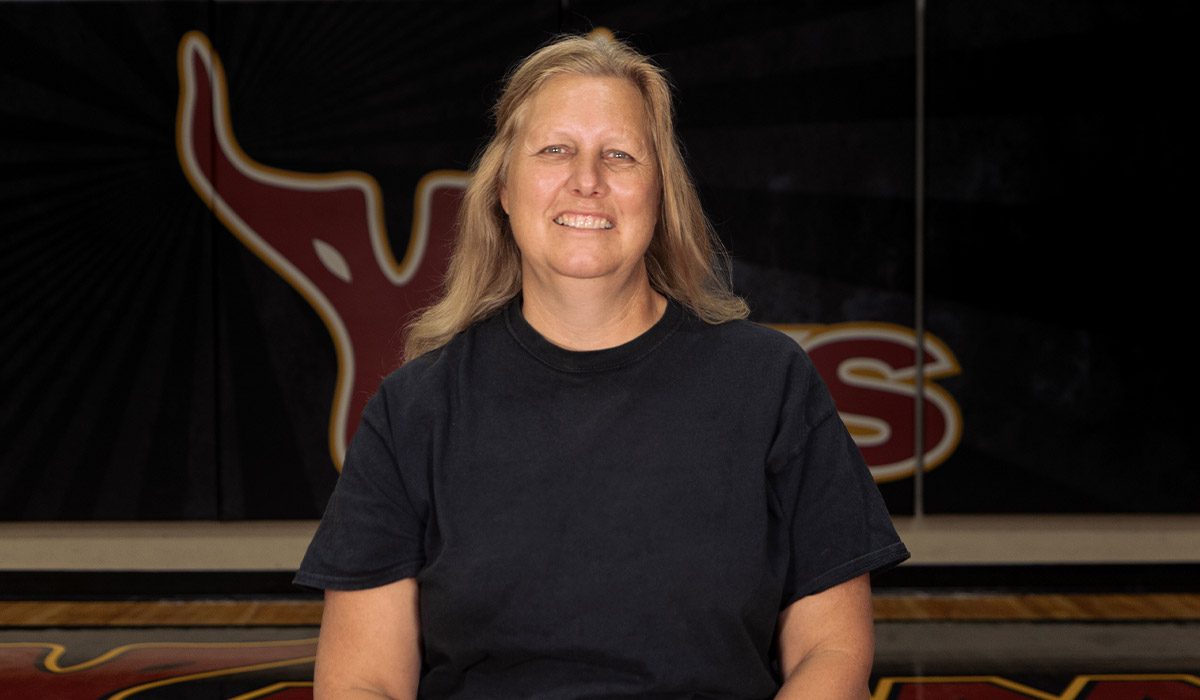Thirty-four years ago, Lanette Hooper led Yakima Valley College to the first of two consecutive Northwest Athletic Conference women’s basketball championships as starting point guard on a team that compiled a 34-1 record.
That competitive spirit still burns inside. During practice, she’ll show her players exactly how she wants them to guard an opponent, though it may necessitate applying an ice pack the next day.
But as Hooper gets her team ready for a new season, she wants a similar gritty, hard-working mentality to become hallmarks for the Yaks.
Family tradition
Hooper’s roots at YVC go deep.
Her father, YVC Hall of Fame coach Ellwood Crosier, began coaching the women’s basketball team when she was in middle school. He compiled a 231-88 overall record leading the women’s program, including back-to-back conference titles in 1990 and 1991.
“He’s the best coach I ever had,” said Hooper. “If he had to correct me, he was right in that correction. He was super smart and the court I’m coaching on now is Ellwood Crosier Court. Most of what I’m teaching is what I learned from him, so it’s kind of sweet to have that connection.”
After finishing her playing career at University of Alaska-Fairbanks, where she earned her bachelor's degree in history and elementary education, Hooper returned to the Yakima Valley. Only 25 years old, she took over coaching the women’s basketball program from her father in 1995, guiding her team to the NWAC East Region championship and an NWAC post-season berth in 1996 while being named the region’s “Coach of the Year.”
One of the keys to making a successful transition to coaching was her position — a point guard focused more on distributing the ball than shooting.
“As player, I was constantly going, ‘Hey, post up this way, we can get that ball to you easier,’ or ‘Hey, we're going to run back door next time’,” she said.
And of course, Hooper had years to soak up knowledge from her father.
“We worked alongside each other. We had a fruit stand, we had an orchard and so he would be talking about things and how he would process stuff. So I learned a lot from that without even thinking about it,” she said.
During Hooper’s three years as head coach, she was able to benefit from the support of her father, who would help scout upcoming opponents.
“Looking at all the little parts and what we need to adjust [as a team], that's actually a very natural thing. Probably because of my dad's conversations where he would just be thinking out loud and I got to hear that.”
Return to YVC
Hooper left her coaching position in 1998 to focus on raising her family. She’s served as a substitute teacher for East Valley School District for nearly 20 years and also stayed involved in coaching AAU basketball and middle school athletics.
With her children older now, when the Yaks head coaching position opened this summer, Hooper said the time was right for her to return to coaching at the collegiate level.
“It's just so fun to be back in that place again of having that competitive mindset,” said Hooper.
Since her coaching stint in the 1990s, Hooper said she’s seen the level of play in women’s basketball increase substantially.
“These girls are so talented,” Hooper said. “They're good at passing and dribbling and know the game a lot better than I think players did before. In the past, players knew their position, but players today just know the overall game better.”
"I really believe in taking care of players in all ways, not just making sure they show up at practice." — Head Coach Lanette Hooper
As coach of the Yaks, Hooper’s goal is to have team success while also giving her players — many of whom have goals to continue their collegiate careers at a four-year school — an opportunity to showcase their talents.
“We do team stuff, but I still want to highlight our players,” Hooper said. “If I want them to get to the next level, I need them to be seen and be successful.”
That can mean designing certain plays that help emphasize each player’s individual skillset. And that also gives Hooper an opportunity to test herself and opposing coaches.
“It is fun to compete against the other coaches and their philosophies and see if I can outplay them from the coaching part of it,” she said.
Supporting players off the court also has become a bigger emphasis. For example, Hooper noted that she’s now organizing study halls for her players to support their academic success.
“I do want to really be a support for them and an added adult in their life,” she said. “I think something that's also changed is people's mental health awareness is a lot more important. I really believe in taking care of players in all ways, not just making sure they show up at practice.”
This season, Hooper says her goal is for the Yaks to be competitive in every game they play.
“Our teams will always play hard,” she said. “Ultimately, I want to get them to the conference tournament because then they get seen by other coaches at four-year programs.”
She also aims to start taking the team every other year to an out-of-state tournament to give players a chance to be seen by more scouts.
“I had that opportunity when I was a player and it changed my trajectory because these
coaches from other programs were there and they saw me play,” Hooper said. “I want
to help make those contacts for my girls who want to continue their playing and education.”
Story and photo by Dustin Wunderlich, director of community relations.
